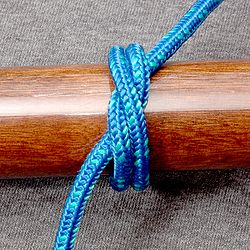(Marked this version for translation) |
|||
| (3 intermediate revisions by the same user not shown) | |||
| Line 9: | Line 9: | ||
| name=Strangle knot | | name=Strangle knot | ||
| image=Strangle-knot-ABOK-1239.jpg | | image=Strangle-knot-ABOK-1239.jpg | ||
| − | | use = The '''Strangle knot''' is a simple binding knot. | + | | use = The '''Strangle knot''' is a simple binding knot. Similar to the constrictor knot, it also features an overhand knot under a riding turn. The difference is that the ends emerge at the outside edges, rather than between the turns as for a constrictor. This knot is actually a rearranged double overhand knot and makes up each half of the double fisherman's knot. |
<!--T:2--> | <!--T:2--> | ||
| Line 16: | Line 16: | ||
<!--T:8--> | <!--T:8--> | ||
}} | }} | ||
| − | |||
| − | |||
| − | |||
<noinclude></translate></noinclude> | <noinclude></translate></noinclude> | ||
Latest revision as of 03:40, 27 July 2022
| Strangle knot |
|---|
|
Use: The Strangle knot is a simple binding knot. Similar to the constrictor knot, it also features an overhand knot under a riding turn. The difference is that the ends emerge at the outside edges, rather than between the turns as for a constrictor. This knot is actually a rearranged double overhand knot and makes up each half of the double fisherman's knot.
When tightened, it is very slip-resistant. It is ideal for constructing a pilot ladder (like a rope ladder, but with wooden rungs).
|

